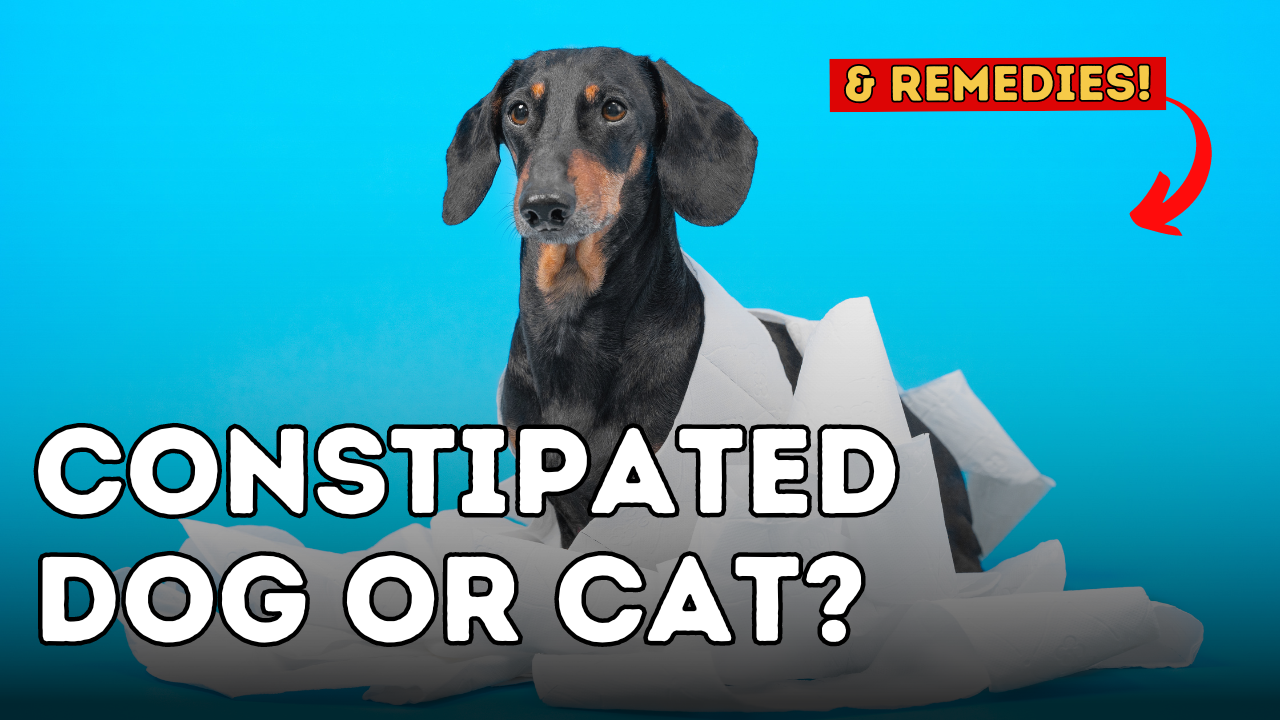Constipated Dog or Cat? Understanding Pet Constipation

I was recently asked this: What I can do for my older cat who keeps having problems with constipation? A common problem.
My quick answer:
1. MORE fluid
2. Canned Food- which means increased fluid
3. Add in a supplement to help with your older cat’s (or older dog’s arthritis), he will then be able to defecate more easily.
Our dog and cat supplements contains adequate levels of glucosamine, chondroitin and MSM, and are now helping thousands of cats (and dogs!) for arthritis.
They are here:
Shop now to relieve your pet’s constipation

What is Constipation in Pets?
Constipation is defined as difficulty in defecation and infrequent bowel movements. Healthy dogs and cats usually have 1-2 stools per day. The common signs of constipation include straining or crying when passing stool, and producing hard, dry stools. A lack of bowel movement for 48 hours is also a sign of constipation, which is similar to symptoms experienced by humans.
Causes of Constipation in Pets
The reasons for constipation vary widely. Dogs often become constipated after eating bones, while older pets, especially cats, may suffer due to decreased activity and lower fluid intake. Certain breeds, like Manx cats, are more prone to constipation. In male dogs, an enlarged prostate gland can obstruct the colon, leading to constipation. Additionally, cats that excessively groom themselves may ingest too much hair, and dogs that eat non-food items like dirt and sand can also become constipated.
Diagnosing Constipation
It’s crucial to confirm that your pet is actually constipated, as dogs can also strain due to diarrhea, and cats might strain from urinary tract infections or obstructions. Always check your pet’s litter box to ensure they are urinating, and if unsure, consult your veterinarian.
Chronic Constipation: Obstipation
When pets are continuously constipated, they may develop a condition called obstipation, commonly seen in cats. This involves the colon becoming dilated and filled with dry, hard feces, causing discomfort, abdominal distension, straining, and loss of appetite. This severe form of constipation requires veterinary intervention, including enemas and medication.
Shop now to relieve your dog’s constipation
Dr. Jones’ Ultimate Canine Advanced Plus Health Formula

At-Home Remedies for Constipation
Dietary Fiber
Adding fiber to your pet’s diet helps normalize stool consistency. For dogs, ground flax seed is beneficial (1 tsp per cup of dog food) and Metamucil (1/2 tsp per 10 lbs of body weight daily). For cats, canned pumpkin is effective (1 tbsp twice daily).
Fluid Intake
Ensuring adequate water intake is essential. Consider adding water to dry food or offering milk or tuna juice to encourage drinking. For cats, especially those prone to constipation, feeding canned food can help increase fluid intake.
Regular Exercise
Exercise stimulates bowel movements. Maintain regular walks for dogs and engage cats with toys and activities like chasing a catnip mouse.
Laxatives
- Vaseline: Safe for preventing hairballs and as a laxative in cats (1 tsp twice daily per 10 lbs for 3-5 days).
- Vitamin C: Can act as a laxative at higher doses (500 mg twice daily).
- Cascara Sagrada: Available as a dried herb, tea, or tincture, typically given at 10mg per 10 lbs once daily, effective within 6-8 hours.
- Castor Oil: Stimulates intestinal muscle movement but should be used cautiously (½ teaspoon per 20 lbs twice daily).
- Miralax: Effective for chronic constipation in cats and dogs (1/4 teaspoon per 10 lbs once or twice daily).
Constipation can significantly affect your pet’s health and quality of life. If you notice signs of constipation, try the recommended home remedies and consult your veterinarian if the condition persists or worsens. Regular monitoring and preventive care can help maintain your pet’s digestive health and overall well-being.
P.S. Constipation is usually a sign of another underlying problem.
Shop now to relieve your cat’s constipation
Ultimate Feline Health Formula


What if ultrasound shows a dogs bowels are immobile? I’m terrified I’ll have to out my dog down soon because of this. I’m giving her soapy warm water enema and that’s the only time she produces. She is taking Metaclopramide 10 mg 3x/day and it worked for a few days but isn’t anymore. I have an x-ray image, ultrasound images & report (in Spanish) and her bloodwork results i can share if I get a response before she’s gone….I cannot afford an MRI. Do you have any Austin’s quickly that can help us??
I use a diluted 1 tsp of honey I syringe my cat Almondmeal I also used light olive oil sunflower oil and chia seeds 2tbsp chia seeds to 1/2 cup warm water shake wait 15 minutes than shake again 1/2 tsp. Pumpkin is very good like he states animal refuses I put cat or small dog in the cat in the bag I use an exotic small syringe water it down. My cat goes right away. I also purchase my own animal enema I administered it myself but that’s harder for most people
That’s great and thanks for sharing.
What about coconut oil suppositories? Would that be safe for a cat?
Hi my cat is prone to constipation I got him a product from Amazon called ezudebra it contains cascara sangrada. Is it okay to give daily or discontinue after a certain time ? Tysm
He already went to the vet and got rx purina om food and lactulose but still doesn’t have soft stools if he doesn’t have a laxative .
He already eats pumpkin and wheatgrass but is somewhat of some help.
Cascara sagrada can be effective as a laxative for pets, but it should not be given daily over an extended period. It’s typically used intermittently and is meant to help relieve constipation. Prolonged use can lead to dependence, meaning your cat’s bowels may rely on the laxative to function properly.